

Sunderland University - Data Analytics for Everyone: Coding for Data Analytics - Institute of CodingInstitute of Coding. Every single Machine Learning course on the internet, ranked by your reviews. By David Venturi A year and a half ago, I dropped out of one of the best computer science programs in Canada. I started creating my own data science master’s program using online resources. I realized that I could learn everything I needed through edX, Coursera, and Udacity instead. And I could learn it faster, more efficiently, and for a fraction of the cost. I’m almost finished now. For the first guide in the series, I recommended a few coding classes for the beginner data scientist.
Now onto machine learning. Education. Machine Learning. About this course: Machine learning is the science of getting computers to act without being explicitly programmed.
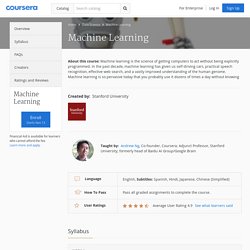
In the past decade, machine learning has given us self-driving cars, practical speech recognition, effective web search, and a vastly improved understanding of the human genome. Machine learning is so pervasive today that you probably use it dozens of times a day without knowing it. Many researchers also think it is the best way to make progress towards human-level AI. In this class, you will learn about the most effective machine learning techniques, and gain practice implementing them and getting them to work for yourself. More importantly, you'll learn about not only the theoretical underpinnings of learning, but also gain the practical know-how needed to quickly and powerfully apply these techniques to new problems. Introduction to Machine Learning. Introduction to Machine Learning Course. Introduction to Machine Learning Course Machine Learning is a first-class ticket to the most exciting careers in data analysis today.
Information Technology Institute. Institute of Coding. Core Modules These modules are compulsory.
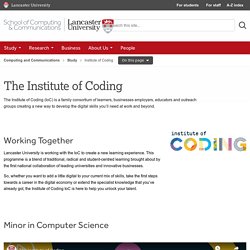
SCC.010 Computational Thinking Dr Jason Alexander Practical computing is all about problem-solving, and methods and techniques exist that provide a structured approach to solving those problems. This module introduces the core transferable skills in computational thinking, namely concepts in: algorithmsabstractiondecompositiongeneralisationhandling common problemsdealing with complexity Students will be taught how to solve puzzles using unplugged activities. SCC.011 The Art of Coding Paul Dempster. Computational Thinking for Problem Solving. Computational thinking is the process of approaching a problem in a systematic manner and creating and expressing a solution such that it can be carried out by a computer.
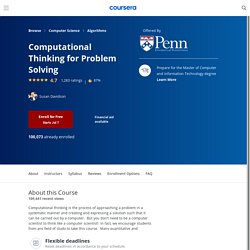
Computational Thinking Requirement. Computational Thinking Requirement To remain relevant in the workplace of tomorrow, undergraduates should acquire basic computational skills, i.e. computational thinking (CT).
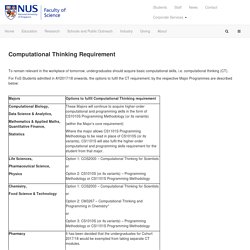
For FoS Students admitted in AY2017/18 onwards, the options to fulfil the CT requirement, by the respective Major Programmes are described below: Notes For all FoS majors, the option to take “CS1010S (or its variants), or CS1101S – Programming Methodology” is open (even if it is not within your major programme requirements), and can be used to fulfil the CT requirement. However, do note that the availability of this module is subject to successful bidding.COS2000 will count as a module from the Computing Sciences subject group of the FoS Faculty requirements.CM3267 will be offered with effect from Sem 2 AY2018/19, and can count as a module from the Computing Sciences subject group, or from the Chemical Sciences subject group of the FoS Faculty requirements.
Special Programme in Science students Double Majors (DMP) COMP_SCI 110: Intro to Computer Programming. Quarter Offered Fall : 10-10:50 MWF ; WilsonWinter : 2 -3:20 TuTh ; Van WartSpring : 11-11:50 MWF ; Van Wart Description Introduction to programming practice using Python.
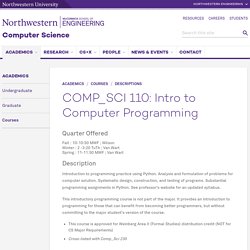
Analysis and formulation of problems for computer solution. Systematic design, construction, and testing of programs. This introductory programming course is not part of the major. UCL Faculty of Life Sciences. 5AAVC210 Introduction to Programming. 5AAVC210 Introduction to Programming Module convenor: Dr Kate DevlinCredits: 15Pre-requisites: only available to BA Digital Culture students and incoming Study Abroad studentsTeaching pattern: Ten one-hour lectures and ten one-hour seminarsModule description: This module will teach students the basic structures and syntax of a common programming/scripting language Python.
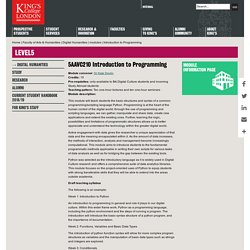
Programming is at the heart of the human control of the digital world; through the use of programming and scripting languages, we can gather, manipulate and share data, create new applications and extend the existing ones. Further, learning the logic, possibilities and limitations of programmatic structures allows us to better appreciate and understand the technology within the greater digital world. Active engagement with data gives the researcher a unique appreciation of that data and the meaning encapsulated within it. Draft teaching syllabus The following is an example: Coding for Non-Coders. Description Coding for Non-coders training course will introduce you to the creative possibilities of code.
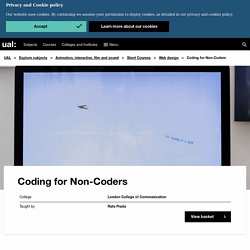
You’ll leave with the ability to create simple products yourself and work confidently with developers on more complex projects. An understanding of code is an essential skill these days, but HTML can see intimidating and confusing. Computer Science for Non-Majors Takes Many Forms. MS Portfolio. Introduction to Computing and IT 2. Open University Student Budget Account The Open University Student Budget Accounts Ltd (OUSBA) offers a convenient 'pay as you go' option to pay your OU fees, which is a secure, quick and easy way to pay.
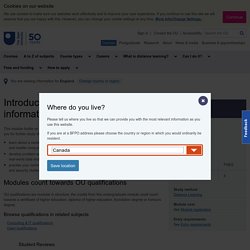
Please note that The Open University works exclusively with OUSBA and is not able to offer you credit facilities from any other provider. All credit is subject to status and proof that you can afford the repayments. You pay the OU through OUSBA in one of the following ways: Register now, pay later – OUSBA pays your module fee direct to the OU.
Joint loan applications If you feel you would be unable to obtain an OUSBA loan on your own due to credit history or affordability issues, OUSBA offers the option to apply for a joint loan application with a third party. As additional affordability checks are required when processing joint loan applications, unfortunately, an instant decision cannot be given. Read more about Open University Student Budget Accounts (OUSBA). Credit/debit card. Introduction to Computing and IT 1. Open University Student Budget Account.
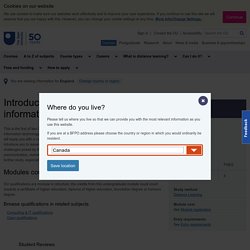
Exploring Computer Science – A K-12/university partnership committed to democratizing computer science. Your Back-to-School Bootcamp with our free online training. Are you ready to FEEL THE BURN…of your heating laptop?
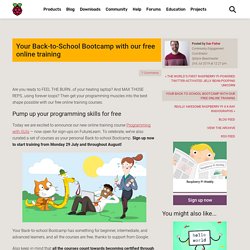
And MAX THOSE REPS…using forever loops? Then get your programming muscles into the best shape possible with our free online training courses.